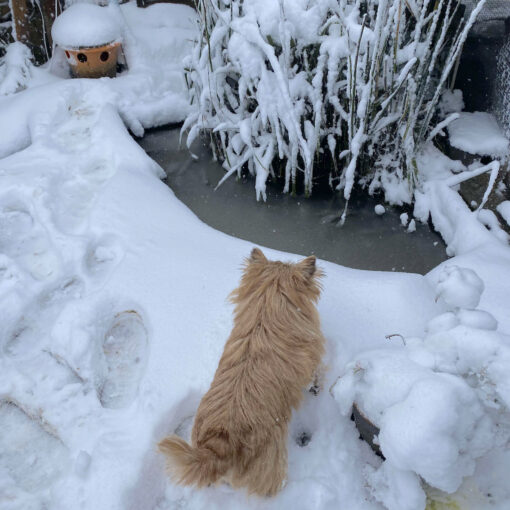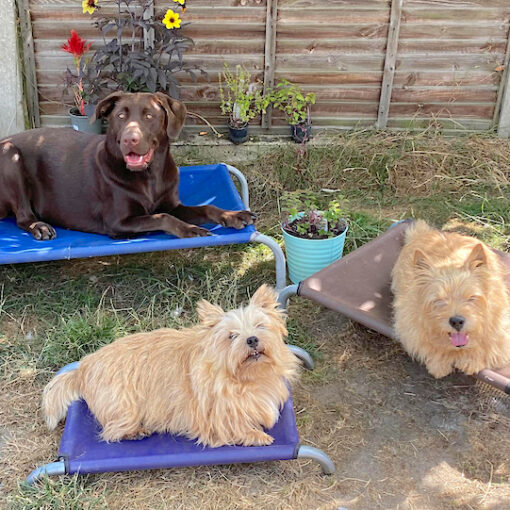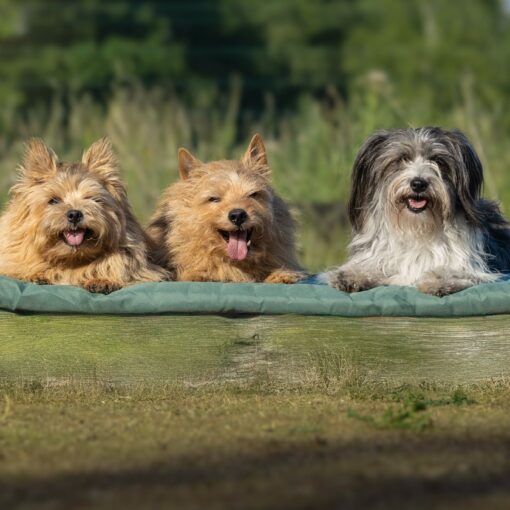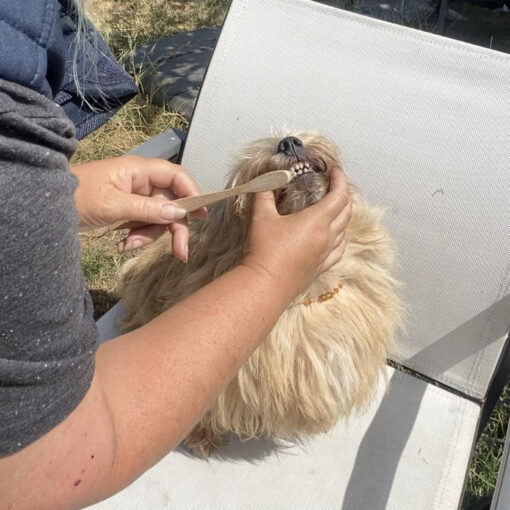Cases of Kennel Cough start increasing this time of year as dogs have their KC Vaccines and dogs start mixing with more dogs at dog shows, sports, events, holidays etc
Kennel Cough is also known as Bordetella and is a very common upper respiratory infection in dogs
Most common symptoms can include:
- A dry hacking cough
- A persistent non specific cough
- Making choking sounds
It’s also possible to observe these symptoms:
- Sneezing
- Retching
- Runny Eyes or Nose
- Unusually tired
- Sometimes vomiting
What Types of Dogs are Affected?
All dogs can be at risk of Kennel Cough and it can be considered as similar to us catching a cold so easily passed when there are dogs being around other dogs
Dogs of all ages can potentially be affected but puppies and elderly dogs can be more at risk of more intense symptoms and are more likely to need vet treatment
All types of dogs can potentially have Kennel Cough and it doesn’t affect one breed more than other with regards to a specific breed being more likely to fall ill but Brachycephalic breeds of dog.
Brachycephalic Breeds include:
Pugs
Bulldogs
French Bulldogs
Boxers
Shih Tzu
Pekingese
Boston Terriers etc
These types of dogs should be watched carefully if they are diagnosed as the KC symptoms can be harder for them to manage
Diagnosing Kennel Cough
It’s not always necessary to visit the vet when you suspect Kennel Cough with your dog as most dogs will improve without medication but if you are unsure let your vet practise know by calling rather than booking an appointment and bringing your dog into the building as it’s highly contagious.
If you are concerned about your dog’s symptoms with Kennel Cough call your vet to ask their advice. They may ask you to bring your dog in to them where they may do bloodwork or send off bacterial cultures as there can be more serious cases of KC that can progress into pneumonia and other complications. Dogs may show symptoms of KC generally for a week or two but more severe cases or dogs with a lower immune system may have symptoms for 1-2 months and if your dog is showing symptoms for more then a couple of weeks calling your vet would be a good move.
Kennel Cough is Highly Contagious
Although it’s called Kennel Cough it’s not only passed between dogs in kennels but the name is given due to it being an illness that is passed between dogs in close contact or who share water bowls or items likes toys and sticks.
So if your dog doesn’t go into kennels it doesn’t mean they won’t ever fall ill to Kennel Cough but being careful about what your dog uses when around other dogs can help lower the risk.
Not using communal water bowls at dog shows, training classes, at the vets etc as this is an easy way for illness to spread via water droplets falling from an unwell dog when drinking and landing in the water bowl to be drunk by another dog or dogs.
Not sharing dog toys without washing them between usage – in our training classes all toys and blankets used by class dogs are taken home and washed by Joe to lower the risk of anything be spread between dogs. Same as our water bowls if a dog uses one rather then us having a communal bowl.
Preventing your dog picking up items on walks that another dog could have picked up previously or that could have drooled on them such as sticks, dog toys that have been left behind, food
items etc.
When an unwell dog sneezes or coughs they can also leave droplets on items, clothing, and on other dogs as well so gatherings with multiple dogs can help spread kennel cough too. Gatherings including dog shows, going to the vets for boosters, daycare, group walks, can easily pass illness so do be aware of how many dogs your dog mixes with.
After exposure to another dog with kennel cough your dog will show symptoms from 2-10 days as it incubates initially. This means it can be difficult to pinpoint where a dog picks it up from and also means dogs can be contagious before showing symptoms. Dogs can feel better and symptoms finish but they still are contagious for a few weeks which is why outbreaks can be so large and so sudden.
Incubation Period and Vaccines
Kennel Cough has an incubation period of around 14 days. Once your dog has their last cough or symptom of the KC they are advised to wait a minimum of 14 days before returning to daycare, training classes, dog shows, breed shows etc. Not only does this give your dog’s body a chance to rest and recover from the virus but if other people are doing the same it means less risk for your dog too.
There is a Kennel Cough vaccine from the vets and although it isn’t intended to fully protect dogs from getting KC in the first place it is designed to help dogs fight the symptoms better. The KC Vaccine helps with several strains of KC but not all of them and so you need to weigh up the pros and cons if you have a dog with a low or compromised immune system.
There are additional ways to help your dog avoid Kennel Cough such as ensuring they are a good weight and not grossly overweight or very underweight, providing a good quality balanced diet, ensuring they have exercise and activity plus looking at supplements that may help them in their life stage.
There are also homeopathic nosodes and tablets that can help with prevention or exposure to Kennel Cough such as:
Aconite 200c
Arnica 200c
Phosphorous 200c
However, it’s recommended to seek the help of an holistic vet for your own dog.
If you suspect your dog has Kennel Cough or it is diagnosed you can look at offering natural ways to help such as giving manuka or local honey in water to soothe the throat, probiotics for a healthy gut and body, adding a little ginger to your dog’s food, offering some small amounts of dried / powdered mushrooms or adding coconut oil to the food.
If you have concerns
Check in with your vet or if you have a vet helpline or zoom service with your dog’s insurance contact them for advice.
Our own training classes and workshops require dogs to stay away during symptoms of KC, and to wait 14 days after the last symptoms are seen. We ask this to prevent extra spread of this illness and if you help with this if your dog has KC then you’ll know more people will be doing the same if their dog has KC so we can help look after each other’s dogs. If your dog does have KC so needs to miss their weekly classes let us know so I can film the exercises for that class or classes and send to you so you can still practise at home but also remember your dog’s body is fighting a virus too!
We hope this has been of help – do feel free to forward onto other dog owning friends and family who you feel may benefit from this information.



